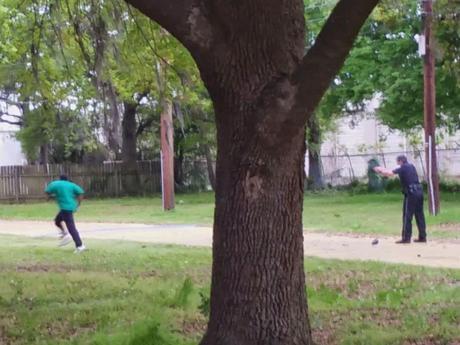
South Carolina Officer Michael Slager shoots a fleeing
Walter Scott in the back.
The public understandably is focused on the brutality that is apparent in the video, plus the fact that Slager has been fired and charged with murder. (See full video at the end of this post.) But the key to the story might lie in the moments before a bystander started shooting video of Scott and Slager struggling in an open, grassy area.
That's because Scott and Slager first encountered each other via a traffic stop. And a 1996 U.S. Supreme Court case on traffic stops might explain why Slager acted with such impunity toward Scott It also might explain why Slager lied about his actions, claiming he shot Scott because he felt threatened--and apparently planting his taser to make it appear that Scott had taken it from him.
The U.S. Supreme Court (SCOTUS) case in question is styled Whren v. United States, 517 U.S. 806 (1996), in which the high court gave its OK for pretextual traffic stops. No one should be surprised that right-wing ideologue Antonin Scalia wrote the opinion in Whren.
What is a traffic stop based on pretext? Here is how one legal Web site describes it:
A "pretext" or "pretextual" stop is a stop in which the officer detains the citizen for a minor crime (i.e. traffic offense) because the officer actually suspects the person of involvement in another, more significant crime (i.e. drug possession).
In other words, a pretext stop involves deception. A law enforcement officer tells a citizen he is being stopped for one thing, when he's really being stopped for something else. And the nation's highest court, in Whren, has said this is perfectly fine.
According to news reports, Slager stopped Scott because he had a broken brake light on his vehicle. Reports also indicate Scott was wanted on a family-court warrant because he was behind on child-support payments.
Did Scott really have a broken brake light? It's possible that he did not, and Slager actually stopped him because he had looked up information about the child-support case. It's also possible Slager stopped Scott simply because he was "driving while black." Whren is almost 20 years old, but petitioners in the case foresaw the kind of tragedy that could happen to someone like Walter Scott. From the Whren opinion:
(Petitioners) argue . . . that "in the unique context of civil traffic regulations" probable cause is not enough. Since, they contend, the use of automobiles is so heavily and minutely regulated that total compliance with traffic and safety rules is nearly impossible, a police officer will almost invariably be able to catch any given motorist in a technical violation. This creates the temptation to use traffic stops as a means of investigating other law violations, as to which no probable cause or even articulable suspicion exists. Petitioners, who are both black, further contend that police officers might decide which motorists to stop based on decidedly impermissible factors, such as the race of the car's occupants. To avoid this danger, they say, the Fourth Amendment test for traffic stops should be, not the normal one (applied by the Court of Appeals) of whether probable cause existed to justify the stop; but rather, whether a police officer, acting reasonably, would have made the stop for the reason given.
The petitioners, in other words, wanted SCOTUS to force officers to be honest in their reasons for conducting traffic stops. But the high court rejected that argument, and in our view, that led to the kind of brutality and dishonesty Officer Slager exhibited during and after the killing of Walter Scott.
Whren is a case where one party before SCOTUS had more foresight and intelligence than the justices themselves. If Scalia and his colleagues had paid attention to a valid argument, Walter Scott might be alive today--and Officer Slager might not stand accused of murder.
Walter Scott shooting from The Post and Courier on Vimeo.
